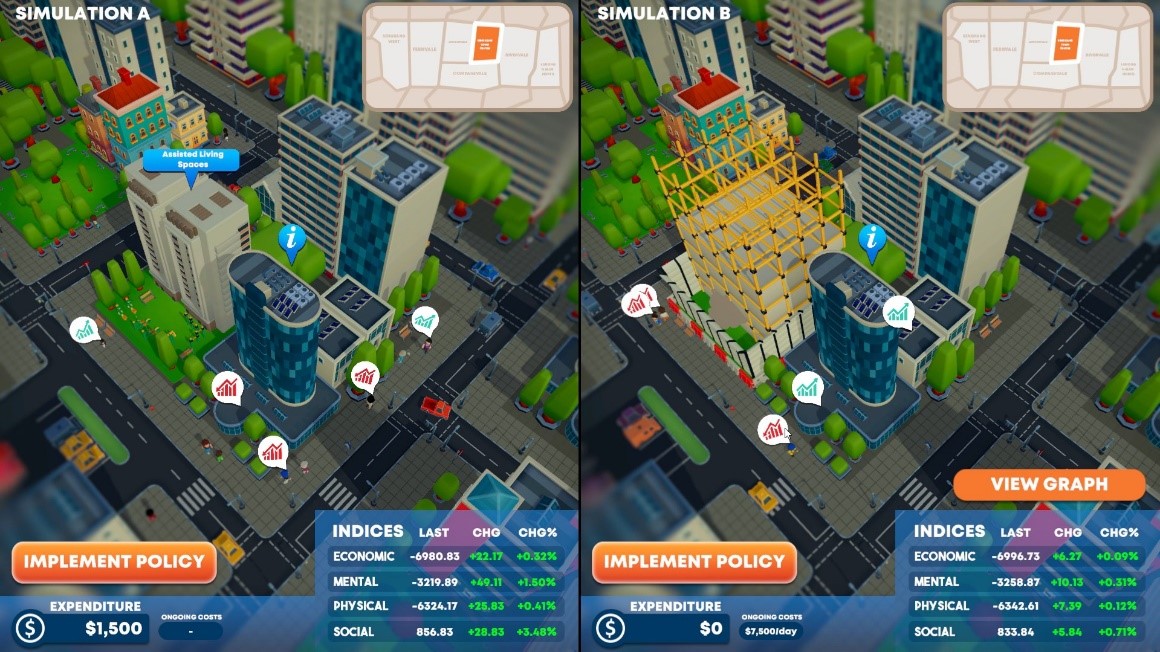
Singapore, 22 October 2024 (Tuesday) – A new study from Singapore Management University (SMU) Centre for Research on Successful Ageing (ROSA) revealed that both physical infrastructure and social connections are essential to enabling older adults to age in place, contributing significantly to their overall well-being. The findings provide important insights into how built and social environments can foster a sense of attachment, social inclusion and identity for Singapore's growing demographic of older adults.
The study, which is ongoing, highlighted that 82.75% of older adults expressed a strong preference to remain in their current homes as they age. This is a clear indication of the desire for continuity and stability, which are supported by accessible amenities and a strong sense of community.
For those who preferred to move, a lack of attachment to their neighbourhoods and feelings of social isolation were significant factors. These respondents reported fewer nearby amenities, smaller social networks, and less social support compared to those intending to age in place.
Underscoring the importance of these findings, Professor Paulin Straughan, Director, ROSA said: "Our study deconstructs what makes ageing in place a palatable option for older adults. It depends on access to age-friendly amenities and social environments that foster place attachment, social inclusion, and a sense of belonging. We are exploring how 'family' can extend beyond the home to the community, ensuring seamless transitions as individuals age."
Researchers at ROSA polled 6,020 Singaporeans between the ages of 53 to 79 (inclusive) in September 2024. Drawing data from the Singapore Life Panel® (SLP), a population representative monthly online survey that has been conducted since 2015, this study was made possible through the generosity of The Ngee Ann Kongsi and the support of the Ministry of Education.
Key early findings and practical implications for society:
1. Ageing in place intentions: The study found that 82.75% of respondents expressed no desire to move out of their current residences, suggesting a preference to age in place. Among the 17.25% who indicated plans to relocate, 57.86% wished to downsize, while 11.67% were interested in public assisted living options. Compared to those who intend to remain their current residence, those who intended to move out in the future reported significantly:
- Lower sense of attachments toward their neighbourhoods
- Higher feelings of social isolation
- Smaller number of close contacts who are living within the neighbourhood
- Fewer amenities within a 10-minute walk
- A lower sense of social support
2. Amenities for ageing in place: Participants identified key amenities necessary for ageing in place, with more than 80% ranking transportation services (bus, MRT), medical facilities, nearby shops and eateries as important or very important. In contrast, only 56.41% rated community centres as important or very important, and only 36.93% rated childcare facilities as important for ageing in place.
3. Discrepancy of needs: Almost 50% of participants live within a 10-mins walking distance of eldercare or active ageing centre, but 70.25% reported that these amenities were important or very important for ageing in place.
4. Social isolation and sense of attachment: ROSA found that higher levels of social isolation were associated with a lower sense of attachment to their neighbourhoods. However, living arrangements (i.e., whether living alone or with others) was unrelated to how attached they felt towards their neighbourhoods.
5. Well-being and sense of attachment: ROSA found a positive association between respondents' sense of attachment to their neighbourhoods and their overall well-being. This meant that older adults' sense of continuity and identity with their neighbourhoods does have a relationship with their well-being.
4th Annual ROSA Symposium on Successful Ageing
The early findings of this new and ongoing study were discussed at ROSA’s fourth annual Symposium on Successful Ageing. Hosted on 22 October 2024 on SMU campus, the event was attended by more than 200 members of government, academia and industry. Mr Tan Kiat How, Senior Minister of State (SMS) for Communications and Information & National Development launched the Symposium with an opening address.

Themed Creating Age-Friendly Environments: Fostering Successful Ageing, this year’s ROSA Symposium on Successful Ageing featured contributions from local and global experts that explored how research and policies influence the well-being and community integration of older adults, and highlighted strategies that foster supportive environments for older adults to age gracefully within their communities.
These discussions at the symposium are in line with the national Age Well SG programme, launched by Singapore’s Ministry of Health, Ministry of National Development and Ministry of Transport to support seniors in ageing well in their homes and their communities.
The dialogue at the Symposium aimed to examine the concerns around ageing in place, and facilitated ROSA’s efforts to continue translating its applied research, drawn from its Singapore Life Panel, into evidence-based policy interventions.
The Singapore Life Panel (SLP)
By 2030, almost 1 in 4 Singaporeans will be over the age of 65[1]. ROSA’s applied research aim to shed light on the optimal ways to enhance the well-being of older adults in Singapore and promote successful ageing.
ROSA’s studies are drawn from a rich repository of data known as the Singapore Life Panel®, a population representative monthly survey of Singaporeans that started in 2015. The SLP has an average response rate of about 7,200 respondents per month and is web-based. With the SLP, ROSA undertakes one of the largest high-frequency surveys in the world, collecting data on a monthly basis to understand ageing trends in Singapore.
Housed in SMU, ROSA’s research underscores SMU’s strategic priority area of Sustainable Living. Through this area of focus, the University seeks to drive solutions in managing climate change and sustainable city living, enhancing quality of life.
[1] Speech by Prime Minister Lee Hsien Loong at the book launch of ‘Singapore Ageing: Issues and Challenges Ahead’.